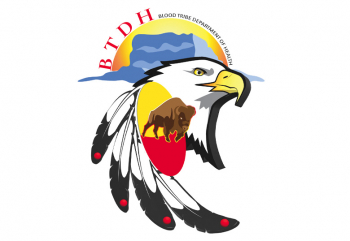The first stage of a collaborative multi-phased approach to enhance health and well-being on the Kainai Nation is underway in a good way, and today the project between the Blood Tribe Department of Health Inc. (BTDH) and University of Lethbridge was named — Sokkinakia’pi.
The name, bestowed upon the project at a Saapihtsimaani (offering prayers with the pipe ceremony) and naming event held in Standoff on Tuesday, is an “all-encompassing term that includes everything that has do with health,” explains Martin Heavy Head, Elder and Blood Tribe Department of Health Board of Directors Chair.

“The word Sokkinaki is the verb ‘to heal or doctor’, and a’pi means ‘all that has to do with’. The full meaning of the word is ‘all that has to do with healing or health’,” says Heavy Head.
In September 2022, BTDH and ULethbridge signed a memorandum of understanding to honour the health-related Calls to Action of the Truth and Reconciliation Commission, partnering to expand health services capacity and delivery on the Blood Reserve. That work has now begun, with the first phase of the plan kicking into gear — a community needs assessment.
The overall project will be co-led and co-managed by the BTDH and ULethbridge, with the research being headed by Melissa Shouting (BHSc ’19) and Janetta Soup (BMgt ’07). Shouting is a registered member of the Kainai (Blood) Nation and faculty member in the University’s Faculty of Health Sciences. Soup is also a registered member of the Kainai (Blood) Nation and the Quality Control Manager with the BDTH.
The aim of the Sokkinakia’pi project in its first two phases is to build upon the existing Kainai Health Services Plan (2016-2025) to identify and/or reconfirm the health needs, tools and resources for the Blood Tribe over the next 10 to 12 years.
The Kainai Health Services Plan sets out a vision of how and where the Tribe will develop its land and community supports/advancements based on data collection and recommendations from various stakeholders using a strength-based holistic approach to maximize self-determination/reliance efforts impacting Blood Tribe members by following Kainayssini.
“To be Blackfoot means an ongoing lifelong relationship with the environmental totality of Blackfoot Territory,” says Iikaisskini (Low Horn), Dr. Leroy Little Bear (BASc (BA) '72, DASc '04), Vice-Provost, Iniskim Indigenous Relations. “Pursuant to the embodiment of the relationship with the environmental totality, Blackfoot, as part of their cultural practices, developed practices not only to maintain good physical well-being but also good mental well-being. In other words, it has long been recognized that mental and physical health go together: mental and physical well-being cannot be separated.”
It's significant to note that Shouting and Soup will lead the first all-Kainai research team in ULethbridge’s Faculty of Health Sciences to undertake a project such as this and that the work will ensure community members are involved in identifying needs as well as participating in both the planning and delivery of service care.
“This project will be the first of its kind, in that it will incorporate the Indigenous-driven international Buffalo Treaty, which serves as a meeting place for place-based knowledge systems to affirm Kainayssini as a governance model as a means to establish collaboration and engagement within community,” says Shouting. “This approach also seeks to build health research capacity within community while enhancing pathways to post-secondary success for Blackfoot students in varying health careers related to their field of study.”
Upon fully understanding the key priorities for the community, the project will move to a phase of action planning where training needs will be identified, recommendations for health priorities will be established and career pathways developed. The overarching goal of Sokkinakia’pi is to expand capacity on the Blood Reserve to support access to high quality health care and health services, and to do so by increasing and creating new pathways for educating, training and preparing health professionals within the Blood Tribe community.
“This partnership is a huge benefit for the Blood Tribe and will support the enhancement of health services for our people,” says Derrick Fox, Chief Executive Officer, BTDH. “This is very exciting for our youth as this ensures our children will have every opportunity to gain education and training to continue our ancestors’ legacy of caring for ourselves in a respectful and dignified approach based on traditional ways of knowing and being.”
Further partnerships will develop as the project moves through its various phases, and at the core of all the work is a commitment to stay true to a journey of co-creation to be rooted in shared values of humility, respect, honesty, kindness, collaboration and strength.
The intention of the Sokkinakia’pi project is to co-create a translatable model that infuses Siksikaitsitapi cultural notions and strengthens the voice and recommendations by and for community members to enable and align the creation and expansion of providing federal and provincial health mandates on the Blood Reserve.
To view online: https://www.ulethbridge.ca/unews/article/sokkinakia%E2%80%99pi-collaborative-project-shape-future-health-care-delivery-kainai-nation
-- 30 --
Contact:
Trevor Kenney, News & Information Manager
403-329-2710
403-360-7639 (cell)
@ULethbridge
Our University’s Blackfoot name is Iniskim, meaning Sacred Buffalo Stone. The University is located in traditional Blackfoot Confederacy territory. We honour the Blackfoot people and their traditional ways of knowing in caring for this land, as well as all Indigenous Peoples who have helped shape and continue to strengthen our University community.